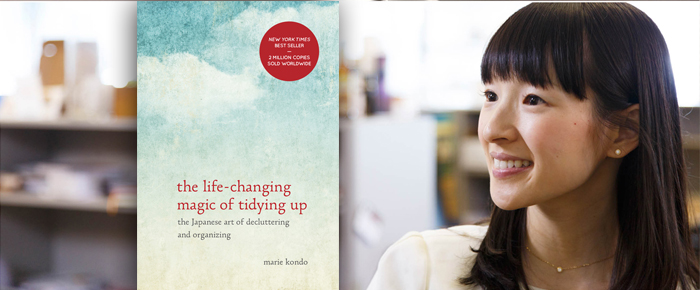
By Heidi Simmons
——
The Life-Changing Magic of Tidying Up
by Marie Kondo
Nonfiction
—–
Having a home and workspace that’s simplified, clean and organized, seems like wishful thinking. It may be something we all want, maybe dream of, but it seems impossible to achieve, especially if you live with others. Perhaps after cleaning in a manic state it might stay tidy for a while, but forever? In Marie Kondo’s The Life-changing Magic of Tidying Up: The Japanese Art of Decluttering and Organizing (Ten Speed Press, 224 pages), putting your house in order will change your life.
From the age of five, author Kondo had a love for home and lifestyle magazines. At age 15, she was inspired to study organizing and tidying. As an adult, she formed a company and a system calling it the KonMari Method. She is Japanese and in some ways a Zen master of sorts. A consultant and professional organizer, Kondo has helped her clients in more ways than just throwing out old unwanted things. She claims to have dramatically transformed their lifestyles, perspective, thinking – and their futures.
Kondo claims by addressing your personal surroundings, you can conquer the psychological issues that keep you from achieving your highest self. Improving your space, improves your life. Pretty simple right? Well, yes and no. Tidying up and keeping it that way takes a certain awareness and a strong commitment.
In the introduction, Kondo admits that not everyone can clean and organize for life. The cause is not lack of skills, but rather one’s state of mind. “Success is 90 percent dependent on our mind-set.” She says, that without addressing the “mind-set” rebound is inevitable. But, by acquiring the KonMari Method, the right technique can be learned and practiced to create order and to become a tidy and organized person.
Kondo believes it has far more to do with the accumulation of mistaken notions than about tidying. “Order is dependent on the extremely personal values of what a person wants to live with.”
Breaking everything into steps, Kondo delivers a way to start discarding and reorganizing “things.” Often she personifies objects giving permission to set them free. She suggests putting everything in a particular category, like shoes, all on the floor. Then evaluate what gives you joy and what you never wear. Only keep what you love. Problem here is you do you have enough space to just sort?
Books are treated the same way as shoes. This is tough in my household. Kondo goes through the whole house room by room sorting all your shit. It’s tough, but it’s good. Maybe it’s most important to take stock of your belongings.
Honestly, the read was great. But putting it into action is not so simple for me. Reading it feels like it’s almost enough. I do feel better about what I have and what I like. But, I still have emotional difficulty getting rid of sentimental attachments.
Where it really makes a difference is in how I shop or look at anything I think I want. I don’t really need anything new. I feel validated not spending money on needless things. (Unless they’re beautiful, unique, odd, interesting or one-of-a-kind.)
As one might expect, the book is well organized and detailed. There are only five chapters, which are broken up with bold subheadings that are numbered at the start of the book for a quick return or reference.
This book has been a bestseller since its US release. Obviously, Americans have too much stuff. After all it’s the American way. I knew The Life-changing Magic of Tidying Up was something I should read, but I avoided it. It was the art on the cover — the serene sky with clouds — that made me finally take in the words of wisdom. I want my life to feel like the cover looks.
There are some strange elements and odd advice in the book to help us understand our things that I think would make more sense if you were born and raised in Japan. For instance: “Your possessions want to help you.” But, learning that you can do without is psychologically liberating. Kondo’s philosophical perspective is that everything you possess should “spark joy and happiness.”
Ultimately, Kondo’s message is clean and simple: Surround yourself with only the things you love! Hopefully, that will leave you some space to walk through your house.








































